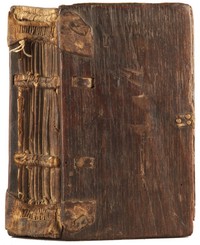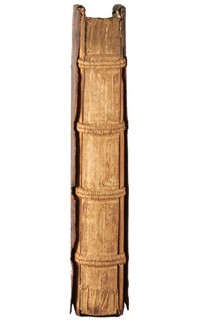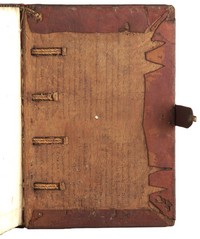During the early medieval period, bookbinders across Europe developed a method we call "supported" sewing. The sewing thread attaches each section of the textblock to sewing supports, such as thongs or cords. Once the sewing process is complete, the ends of these supports are used to attach the two boards. Through the medieval manuscript period and into the incunabula period of early printing (1455-1500), these boards were most often made of wood, and the binders needed to chisel tunnels and channels for the lacing-in of the sewing supports. The first two volumes are among the earliest surviving bindings in the Princeton collection. The leather that once covered them has worn away to reveal the underlying structure of the bindings.
English, fifteenth century
A medieval English binding with thongs laced into oak boards.
| Title: | The Anturs of Arthur; Sir Amadace; The Avowing of Arthur; Hale Court Records, 1413-1475. |
| Locale: | England, 15th century. |
| Location: | Manuscripts Division: Robert H. Taylor Collection |
| Call number: | Taylor Ms 9 |
| Dimensions: | 28 x 21 cm |
French, twelfth century
Perhaps the earliest surviving European binding at Princeton, this twelfth-century French binding was once covered with the same white deerskin that is still attached to the inside of the boards.
| Author: | Augustine, Saint, Bishop of Hippo |
| Title: | Sermons on the Epistles of John. |
| Locale: | Eastern France, early 12th century. |
| Location: | Manuscripts Divsion: Robert Garrett Collection |
| Call number: | Garrett Ms 64 |
| Dimensions: | 20 x 12 cm |
German, sixteenth century
German binders of the fifteenth and sixteenth centuries often used cords for sewing supports. Here the ends of the cords go over the edges of the wooden boards and into holes and channels, in contrast to the earlier method of lacing through tunnels in the edges of the boards.
| Author: | Xenophon |
| Title: | Xenophontis ... Opera. |
| Published: | Basel: Andreas Cratander, 1534. |
| Location: | Rare Books (Ex) |
| Call number: | Oversize 2795.2534q |
| Spine height: | 32 cm |
German, fifteenth century
The cord supports are anchored with wooden or leather pegs visible on the inside of the back board of this fifteenth-century German binding.
| Author: | Nicholas, of Osimo, d. 1453 |
| Title: | Supplementum Summae Pisanellae. |
| Published: | Venice: Franz Renner and Nicolas von Frankfurt, 1474. |
| Location: | Rare Books: Incunabula Collection (ExI) |
| Call number: | 5707.674 |
| Spine height: | 29 cm |



